Kabini River Lodge
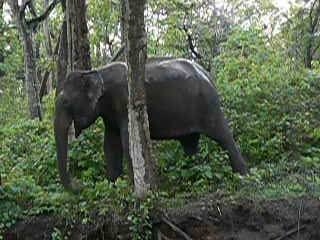
I spent the weekend at Kabini River Lodge about 2 1/2 hours from Mysore, in the southwestern corner of the neighboring state to Tamil Nadu, Karnataka. Kabini is a former hunting lodge of British diplomats and royals as well as the would-be royal, the Maharaja of Mysore--the appointed Indian ruler of the Mysore area. Built in the 1800s, it is a fantastic place---deep in the wilderness, at the edge of the Nagarhole National Forest, lush and secluded.
Although not a Marty-friendly place (no air conditioning, very little meat, and bone-jarring rides through the backwoods), Kabini offered peace and quiet and wonderful views of wildlife---not to mention a joyride on an elephant (my first). The place was full of pictures of from the days of the British raj--a delegation from Russia camped there in the 1890s, and the last British viceroy to stay at Kabini was Lord Mountbatten, shown in a 1933 photo with then Prince Edward (three years before he abdicated the throne to "marry the woman I love."). It was also surprisingly cool after the sweltering heat of Chennai.
Mysore was not returned to India until several years after independence, and Kabini was used for a number of years by the Indian military. It became a resort in 1979, after the construction of a dam that flooded local villages, but also provided a more secure environment at Nagarhole for wildlife. It was at that time that Colonel John Wakefield---now nearly 90 and a resident of India for most of his adult life, save for schooling in Britain and service in the British army in Singapore and Burma during World War II ---came to Kabini. He still lives there in a wing of the Viceroy's compound, and entertains visitors with lively tales of the area's history. Now a committed conservationist, he shot his first tiger at the age of 9.
The Nagarhole park which Kabini abuts has about 65 tigers, but as the park is over 300 sq. kilometers in area, that makes them difficult to sight, and I wasn't lucky enough to see one on this trip (though one was spotted the week before). The closest we got was to see the telltale "pads" along the dirt road, where tigers often traverse at night. One group did see a leopard (for 45 seconds) which is even more unusual to spot than a tiger, and we saw a pack of wild dogs, which are also considered rare.
More common are elephants---including stately "tuskers" (in Asian elephants, only the male has tusks)--spotted deer, barking deer, gaur (Indian bison), peacocks, wild boars, and painted storks. We went out in safari jeeps late in the afternoon and early in the morning, which are the best times. One afternoon, we also went by boat and saw a couple of crocodiles, but I much preferred the jeep rides. It was wonderful to see so many elephants in the wild--munching on bamboo along the road, a mother leading her two calves through the forest, a lone tusker by the water in the late afternoon. A pack of ten wild dogs entertained us this morning, watching us warily as they made their way down the road and into the woods. These are not guys you'd want to mess with--though tiny, two of them can fell a spotted deer and the pack will clean it up in 15 minutes or less.
By the water in one spot was a tiny Ganesha--a Hindu god that is part elephant--and he certainly seemed to symbolize the place. This was the last good weekend to visit Kabini, though, before the monsoon, which hit the coast this morning. Over the next two or three months, Kabini, along with much of the rest of Karnataka, will be drenched with rain, and while the forest will be lush and green, it will also make the dirt roads impassable and hide many of the residents ---including the elusive tiger.
More Construction
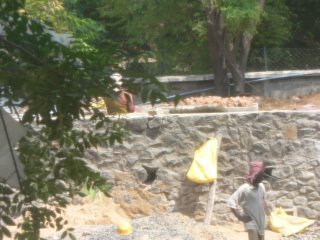
I have been doing battle with the construction next door, and wound up having to get the police involved.
About a week ago, I was awakened at 3:00 a.m. by the sound of earthmoving equipment. A full blown operation was going on next door---in the middle of the night! I didn't know what to do, so I moved into the room that faces the inner court, where the noise could not be heard.
The next night the same thing happened, this time at 1:30 a.m. By this time, I had found out that there are ordinances about disturbing the peace here, and also where to call--the police emergency line at 100. Although it was difficult to make myself understood because I don't speak Tamil, I must have gotten through, because about a half hour later, the noise suddenly ceased. I dropped back off to sleep.
But not for long. The phone started ringing. I missed answering it the first time, but it rang again. It was the police administration office.
"Madam calling, sound," said the female voice. "Madam living place?" Not understanding, I said, "Yes, no sound now. Thank you. " I hung up the phone.
I went back to bed, and had just dozed off when the phone rang again. Same voice.
"Madam living place" said the voice. By now I am getting irritated, and I really don't understand. "Madam living place needing," said the voice. "You call, police come, needing living place." "No," I said, "please not come to my house now. I am sleeping. I want to sleep."
"Madam living place needing," repeated the voice. "Which street Madam living place?"
Finally I get it---she wants my address for the official record. But I am by now very tired, and very cranky---so after a few choice words at the irony of it all--- I simply took the phone off the hook.
The next day our government affairs person was able to get through to the commissioner's office to get the situation permanently resolved (since I was pretty sure the situation would reoccur with the same results every night until one or the other of us gave in). Earthmoving and other heavy construction equipment is in short supply here, so undoubtedly the contractor that is building the apartment building next door had figured to save some money by having the work done at night. Now they begin during the week at 5:00 a.m.---which is also not great, but at least it's just before I get up in the morning. With all the construction going on in Chennai, I'm sure it won't be long before they disturb someone else's sleep.
Dad
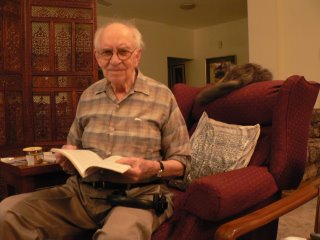
People who know my father often inquire how he is faring in India. In February, I gave a talk at a conference in Mumbai, and I told the audience that I was here with my family including my 88 year old dad. What surprised me is that when I said that I thought he was getting care better than he could get in the U.S., the audience burst into applause.
Overall, Dad's health is pretty good considering his age. He has slowed down a lot since we were in the States, though, and doesn't get around quite as well---he's more wobbly, I notice, and walks more slowly. A few times a day, he has to use one of those lung capacity devices with the balls that rise to the top as you blow air into them. When we left the States a year ago, he was still able to accompany Marty to Costco and push the cart around. When we arrived here, we often used to take him when we went out to dinner. But now, this is quite an ordeal. Every day, he and Ganesh take a couple of short walks back and forth in the apartment complex, and even this will leave him tired.
Ganesh comes six days a week, and stays until about 8 or 8:30 p.m. and he stays all night when we--now I-- am out of town. They watch T.V. together or read---Dad has an array of Titantic, astronomy, and Emily Dickinson books on the coffee table that he picks up---and was quite interested the other day in a article I showed him on the last American survivor of the Titanic, who died at the age of 99. He retains very little of what he reads, but he is still able and interested to do it, and that is what counts.
What is sad for me is seeing him lose more and more of his mental capacity, and yet, despite this, his personality still shines through, and it is really a blessing that he can be with us. He doesn't have Alzheimer's, but more of a garden variety dementia that, although it has robbed him of his short term memory and cognitive ability, has thankfully not taken his wit. One morning when Ganesh was off, Marty went into Dad's bedroom to wake him up. Dad had other ideas, and told Marty petulantly, "Go pick on somebody else." He sometimes doesn't remember that we are in India, so at dinner we play a game where I ask him where we are, until he gets the right answer. But last night when I asked this question he just rolled his eyes at me and said, "why, at the table, dear"---so I think I'm going to have to come up with a new game.
Marty Heads Back
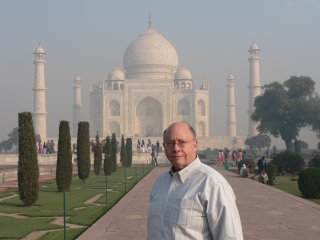
Today is a bummer day for us. Marty is returning to the U.S. early Monday morning, and we are not sure when he will be back. This is related to his business. When he was home in March, he reserved an efficiency apartment in the same building as our daughter Sara, and has started to purchase a few things online (Costco of course) so that we don't have to get into our storage. I will be going on home leave in about six weeks, so it won't be that long of a separation this time---but it will still be a big adjustment for both of us. From there we will have to play it by ear....always exciting being an international service employee!!
In other news, this week we were invited to the home of a Tamil film producer, Ram Kumar, who is in the same Rotary club as Marty. His father was a very famous actor named Shivaji Ganesan, called "the Marlon Brando of India" who starred in something like 300 films. He died about five years ago, and his children now live together in the large family home not far from our place, which is a veritable shrine of awards and pictures of the film star's life. Although none of Shivaji Ganesan's films are in English that I know of, everyone says that he was a marvelous actor, so I plan to pick up a DVD and try to follow one of the more famous movies, even though I won't understand but a few words of it.
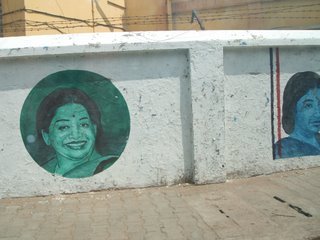 This is election week in Tamil Nadu. The post of Chief Minister, currently held by former Tamil movie star Jayalalitha, is hotly contested. Jayalalitha, a Brahhim (highest caste) from Mysore, near Bangalore, has been in the job three different times. She was forced to resign in 2001 because of a bribery scandal, but came back 5 months later. She is one of the first people you "meet" when you come here, because her face is all over the place in billboards and other signs (even on walls as to the left) with the appellation "Amma" or mother. Her opponent, Karunandhi, is also from the film industry---but as a script writer. He has also been Chief Minister on several occasions. The Hindu polling is calling the election "too close to call," but to ensure that people go to the polls sober, the government has imposed "dry days" on the State from 4 p.m. on Saturday and today. The election promises by both sides are very interesting---free computers for students passing a certain test, free color T.V.s for the poor, free rice, and gold bracelets for girls ("certain categories") being married. More ominously, Karunandhi promises 3 lakh (300,000) government jobs.....
This is election week in Tamil Nadu. The post of Chief Minister, currently held by former Tamil movie star Jayalalitha, is hotly contested. Jayalalitha, a Brahhim (highest caste) from Mysore, near Bangalore, has been in the job three different times. She was forced to resign in 2001 because of a bribery scandal, but came back 5 months later. She is one of the first people you "meet" when you come here, because her face is all over the place in billboards and other signs (even on walls as to the left) with the appellation "Amma" or mother. Her opponent, Karunandhi, is also from the film industry---but as a script writer. He has also been Chief Minister on several occasions. The Hindu polling is calling the election "too close to call," but to ensure that people go to the polls sober, the government has imposed "dry days" on the State from 4 p.m. on Saturday and today. The election promises by both sides are very interesting---free computers for students passing a certain test, free color T.V.s for the poor, free rice, and gold bracelets for girls ("certain categories") being married. More ominously, Karunandhi promises 3 lakh (300,000) government jobs.....Green Kerala
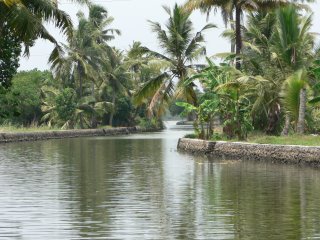
We spent a long weekend in Kerala--a couple of nights in Cochin, and one on a houseboat tour on out of Alleppy, about an hour and half drive from Cochin.
The houseboat tour took us into the backwaters of Kerala, where we had a chance to observe the rice farmers, fisherfolk, and coir workers who live along the waterways, not to mention some of the most lush and verdant landscape in the country--overwhelmingly green. We had a one-bedroom (air conditioned from 9 p.m. to 7 a.m.) boat, with a crew of three including a cook. These boats, which are now built for tourism, used to be rice haulers, with the rice stored in the hold and the living quarters on the top. Kerala rice is quite different from any we've had elsewhere---the grains are almost the size of orzo. Kerala cuisine is heavy on coconut and bananas, and we even had fried bananas as an afternoon snack.
The river is used for washing clothes, utensils, and for bathing---we saw quite a few people taking baths along the way. (more pictures on Flickr up top).
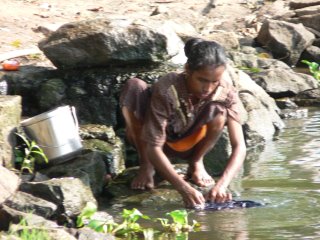
This area is called the "Venice of India," because it is a series of waterways where the only way to get around is by boat. The government provides ferries that get people around, and there are government schools along the route as well, going up to high school.
Kerala does not have much industry besides the traditional trades and tourism, because the politics are heavily communist and labor tends to be quite militant here. Interestingly, the state also has one of the highest literacy rates in the country. Recently, they have tried to attract IT and other industries here, but it seems to be tough going. Many young Keralites leave the region and head over to Tamil Nadu for employment.
Kerala is also heavily Syrian Christian, so called because of the influence of Thomas the Apostle, who supposedly came to India in 52 A.D. and converted both Hindus and some of the Jewish settlers who had preceded him (this history is in dispute). Cochin, in fact, has the oldest Jewish community (now mostly dispersed) in India. We visited the synagogue at the end of the street called Jewtown; here you can see Marty in front of the ark.
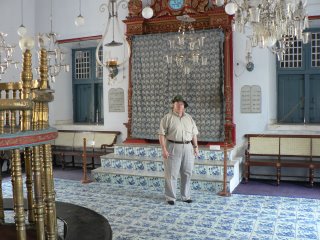
Due to the imported Chinese flooring (every tile is unique) you are required to remove your shoes before entering the shul:
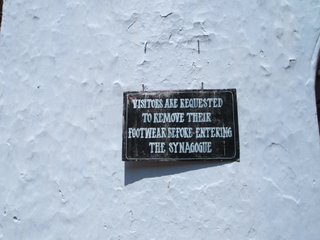 Only a few Jews remain in Cochin, so the synagogue rarely gets a minyan, except on holidays, and is mostly a tourist sight---in fact, there were a surprising number of visitors when we went there, both Indian and Western. Along the way, we stopped at Sarah's Embroidery, where Sarah herself--a sprightly octagenarian--presides. She makes a number of hand embroidered items, such as Sabbath bread covers, yarmulkes, and other items. Today, these are among the few
Only a few Jews remain in Cochin, so the synagogue rarely gets a minyan, except on holidays, and is mostly a tourist sight---in fact, there were a surprising number of visitors when we went there, both Indian and Western. Along the way, we stopped at Sarah's Embroidery, where Sarah herself--a sprightly octagenarian--presides. She makes a number of hand embroidered items, such as Sabbath bread covers, yarmulkes, and other items. Today, these are among the few
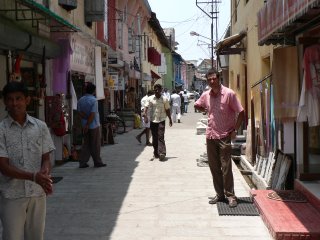 Jewish items available on Jew Street. Jewtown, which used to be lined with Jewish shops, is now mostly Christian, with shops catering to tourists offering everything from clothing to fake antiques. Merchants literally lie in wait (picture to the right) cajoling you to "come inside and see my goods, no obligation to buy."
Jewish items available on Jew Street. Jewtown, which used to be lined with Jewish shops, is now mostly Christian, with shops catering to tourists offering everything from clothing to fake antiques. Merchants literally lie in wait (picture to the right) cajoling you to "come inside and see my goods, no obligation to buy."

